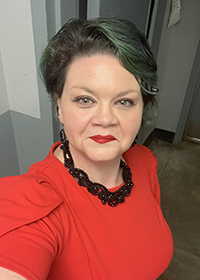Name 
Kimberly Dunlow
School & School System Where You Work
DF Walker Elementary School, Edenton Chowan Schools
Number of Years Teaching
18
Teaching Area(s)
Elementary & Chorus
Grade Level
Elementary School
What do you love most about teaching music?
I love sharing my passion and love for music in hopes that it will not only spark an interest in music but that it will lead to students discovering what they love and have a passion for in life.
Who inspired you to be a music educator and how did they inspire you?
While I have had several great music teachers, the one that really inspired me to pursue my passion for music was Mrs. Karen Knowles. She was my Music Teacher in K-1st grade and during high school became my private voice teacher. She is now like a 2nd Mom and mentor to me. I was inspired by not only how music was her saving grace during her school age days but also her drive for musical excellence and the way that music is just part of who she is as a person.
What did you need the most when you started teaching?
Musical Instruments, technology and Support! Having quality musical instruments in the elementary setting is a very important part. In our changing world, having up to date technology is also very important. Both of these elements help a teacher to create wonderful experiences for their students. Most importantly, having the support of administration, other teachers, and especially other music teachers is extremely needed in those first couple of years. While we will always need support, having that support system in place can make or break those first couple of years teaching.
Describe the biggest challenge to teaching music education and how you have worked to overcome this challenge?
I think overall the biggest challenge to teaching music has been building up programs that are seen as important parts of the educational experience rather than a glorified babysitting service. To overcome this stigma, I have strived, along with my Cultural Arts colleagues, to bring attention to our programs and how they serve our students on different levels that the regular classroom can sometimes not provide. I believe that being visual in the community and bringing the talents/gifts of our students out beyond the classroom helps our program to shine and show is vitality to those whom may overlook these programs.
How do you advocate for your program?
In my career so far, I have had the honor of serving as Arts Coordinator in the past as well as serving our Arts Educators in providing Professional Development sessions and one on one support. In doing so, I was able to keep in contact with central office support and community organizations to bring positive attention to our programs and the importance that they serve in our student’s lives. I was able to start a district wide ArtsFest event, in which all the arts programs in the county came together to perform and show off their work. I was able to write grants for musical instruments and equipment for two school systems. I was able to serve as a state trainer during our ASW phase and provide professional development opportunity for teachers in several districts. In my current county, I am part of a wonderful team of music educators who are also working on restarting a county wide Arts evening event, as well as continuing to bring attention to my program through community performances and bringing in outside sources in which to help with the music education of my students.
What is one piece of advice you would give to beginning teachers?
Find your support system, be consistent with your words, and build relationships. Find those teachers, and administrations that believe in what you are doing and want to be your partners. Those people are so important in those first few years when you are trying to stay above water learning all the things that you can not learn just in the college classroom. When you speak with students, be consistent in what you say and do. Do not tell a student you will do a certain thing without backing it up. Students pay attention to how you act and what you say…if you say you are going to do something, do it! If there are positive and/or negative consequences, make sure you follow through. Not only will they respect you for it (although they may not like it), they will also know that they can trust you, which is so important to building relationships.
How do you build relationships with students and parents?
I like to get to know my students by finding out about their interests, what drives them in life, etc. It takes some time but as students get to know you as a person and what drives you, what your interests are, they start to trust you and hopefully become invested in not only your class but also in your belief of them. As I build the relationship with the student, parental relationships can come along side to support those budding relationships and build trust not only with the student but also with the parents. I find that communication with them through text or face to face, especially ones that are able to come out to performance opportunities gives great chances to get to know what parents do for a living and how they support their child’s education. I like to pay attention to details so that it shows that I am invested not only in the child but also in their daily lives (which includes their parents).
